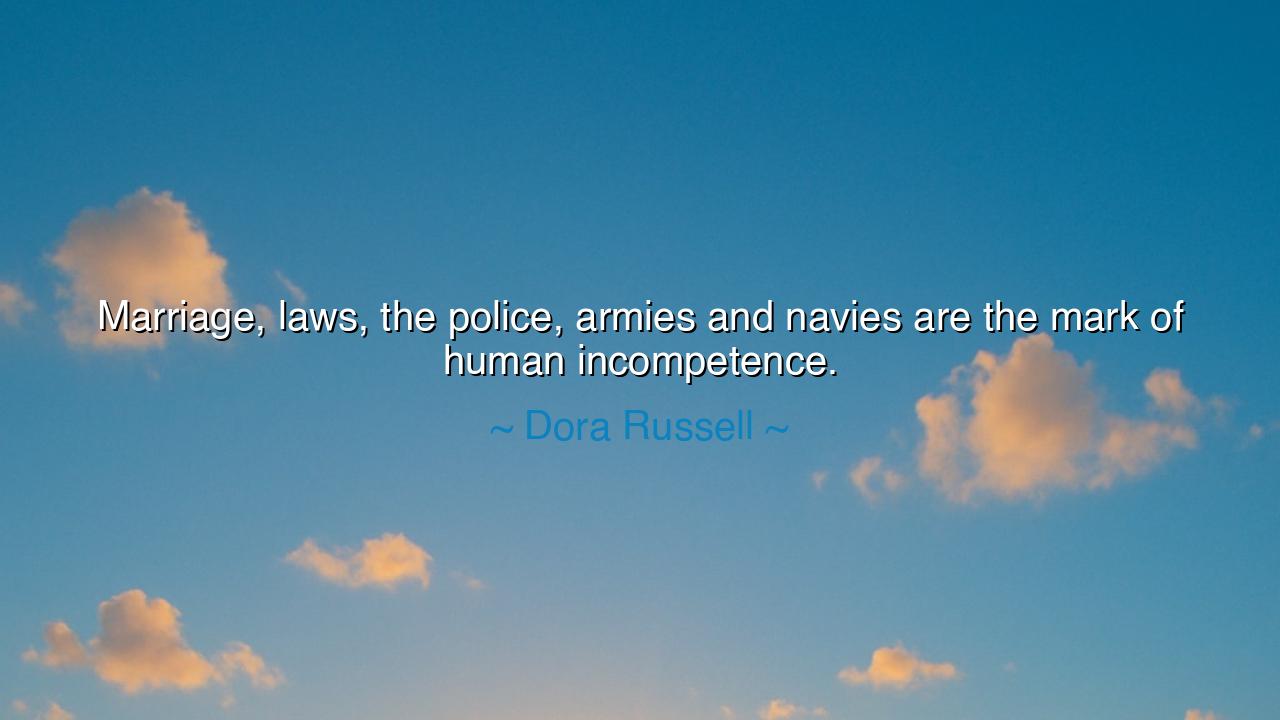
Marriage, laws, the police, armies and navies are the mark of






In the ancient teachings of humanity, there are moments when the very foundations of society are questioned, and the institutions we hold most sacred are revealed to be, at their core, imperfect and born of our deepest incompetence. The words of Dora Russell—"Marriage, laws, the police, armies and navies are the mark of human incompetence"—strike like a sharp wind against the structures we have built to govern and protect us. She speaks not out of disdain for society, but with a profound awareness that these institutions, though necessary, arise from our failure to achieve something greater: a world where these institutions would not be needed because humanity would live in harmony and justice.
At the heart of Russell’s statement lies a critique of the structures that have come to dominate human society. Marriage, once a union of love and mutual support, has too often become an institution that reflects the imposition of societal expectations rather than the true connection between individuals. Laws, once designed to guide human behavior, now too often serve as tools of control, punishing those who do not conform to arbitrary standards. Police, armies, and navies, rather than instruments of protection, have sometimes been wielded as means of enforcing dominance, leading to conflict rather than cooperation. These institutions, Russell suggests, are not solutions, but admissions of failure—the failure of humanity to live without the need for such structures, to live without the force of law or the threat of violence.
Consider the ancient city-state of Athens, the cradle of democracy, where the laws of the land were created not to control, but to protect the freedom of its citizens. Yet, even in the height of Athenian democracy, there were institutions of power that often served more to perpetuate inequality than to resolve the fundamental struggles of human existence. Slavery, a practice long accepted in Athenian society, was a glaring contradiction to the ideals of liberty and justice that the Athenians prided themselves on. The Athenian military, while a source of pride, was also the instrument of conquest, leading to the subjugation of other peoples. Even the democratic laws they passed were sometimes more about maintaining order than ensuring the freedom of all. Athens, like all societies, was built upon foundations of imbalance and imperfection.
Russell’s words invite us to reflect on the notion that these very institutions—from marriage to armies—are not marks of human achievement, but of our failure to live peacefully without the need for external enforcement. The fact that laws are required to maintain order speaks to the imperfection of our nature, that we have not yet reached a state where justice can be self-regulated. Marriage too, often seen as the highest form of human connection, has at times become a mechanism of control rather than a celebration of equality and love. It reflects our inability to maintain lasting harmony through mutual respect alone.
And yet, while Russell’s critique is harsh, it is not without hope. For in acknowledging the imperfection of human institutions, we come closer to the truth—that society is not static, but ever-evolving. The lesson from Russell’s words is not that we should abandon all institutions, but that we must strive to create a world where such institutions are no longer necessary. Where marriage can be freely chosen for the sake of love, and not imposed by societal expectation. Where laws are not enforced by violence, but through a collective commitment to justice. Where the military and the police are not necessary to maintain peace, because that peace is already present in the hearts of every citizen.
This is not a utopian dream, but a vision of what humanity can strive for. It is a call to action, a reminder that the true strength of a society lies not in its structures, but in the hearts and minds of its people. As we move forward, we must seek to build a world where the need for such institutions is diminished by the rise of compassion, understanding, and cooperation. We must work to create systems where justice does not come from the barrel of a gun, but from the hearts of those who live with integrity and honor.
In your own life, reflect on these lessons: How often do you rely on external forces—laws, social norms, or even force—to maintain order and peace? How much of your personal freedom is tied to systems that, at their core, reflect the imperfection of human nature? As you seek to live with honor, justice, and love, recognize that true peace comes not from the systems we create, but from the transformation of the human heart. Let us strive not to defend the structures of incompetence, but to create a world where understanding and equality replace the need for such systems, and where true harmony can flourish without the chains of law or the threat of violence.






AAdministratorAdministrator
Welcome, honored guests. Please leave a comment, we will respond soon